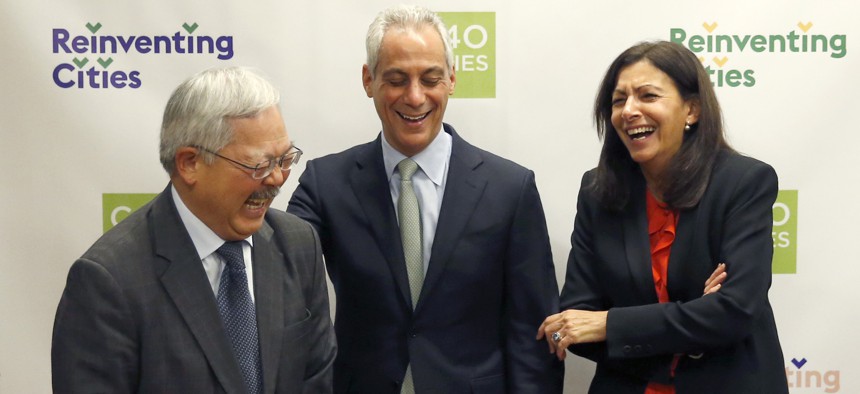Mayors Gather in Chicago to Sign New International Municipal Climate Charter

Chicago Mayor Rahm Emanuel, center, shares a laugh with fellow mayors Mayor Ed Lee, of San Francisco, left, and Mayor Anne Hidalgo, of Paris, at the North American Climate Summit in Chicago. Charles Rex Arbogast / AP Photo

Connecting state and local government leaders
"Rather than burying our heads in the sand, Chicago is working with cities across the country and around the world to address the threat of climate change," according to Mayor Rahm Emanuel.
More than 50 municipal leaders from around the world gathered in Chicago on Tuesday to sign a first-of-its-kind international charter on climate change that aims to marshal the combined power of city governments to enact policies that meet or exceed goals to reduce emissions as outlined in the Paris Agreement that was adopted in 2015.
The Trump administration announced earlier this year its intention to withdraw the United States from its commitments under the Paris Agreement.
The Chicago Charter, as the new agreement is called, stands in opposition to the White House’s attitudes on taking action to address the impacts of climate change.
"Rather than burying our heads in the sand, Chicago is working with cities across the country and around the world to address the threat of climate change," Chicago Mayor Rahm Emanuel said in an announcement. "The Chicago Climate Charter represents tens of million residents who are committed to confronting climate change head-on. Even as Washington fails to act, cities have the power and will to take decisive action to protect our planet and the health and safety of our residents."
The venue for the signing of the Chicago Charter was the North American Climate Summit, where Emanuel was joined by municipal leaders including Mexico City Mayor Miguel Ángel Mancera, Vancouver Mayor Gregor Robertson, and Paris Mayor Anne Hidalgo.
Other U.S. mayors who signed the Chicago Charter include Austin, Texas Mayor Steve Adler; Phoenix Mayor Greg Stanton; Salt Lake City Mayor Jackie Biskupski; San Francisco Mayor Ed Lee; Santa Monica, California Mayor Ted Winterer; and University Park, Missouri Mayor Shelley Welsch.
According to an announcement from Emanuel’s office:
By signing the Chicago Climate Charter, cities are pledging to:
- Achieve a percent reduction in carbon emissions in line with the Paris Agreement;
- Quantify, track and publicly report city emissions, consistent with standards
- and best practices of measurement and transparency;
- Advocate alongside other mayors for greater local authority and flexibility to develop policies and local laws that empower cities to take aggressive action on climate;
- Recognize and include groups traditionally underrepresented in climate policy;
- Incorporate the realities of climate change and its impacts into local infrastructure and emergency planning through strategies of adaptation and resilience;
- Support strong regional, state and federal policies and partnerships, as well as private sector initiatives, that incentivize the transition to a new climate economy; and
- Partner with experts, communities, businesses, environmental justice groups, advocates and other allies to develop holistic climate mitigation and resilience solutions.
"This Charter is a great example of how cities are working together and encouraging one another to aim higher, and it will add momentum to America's progress fighting climate change,” former New York City Mayor Michael Bloomberg said in a statement.
Bloomberg co-chairs America’s Pledge, a group of U.S. states, cities and businesses that aims to reduce their greenhouse gas emissions in accordance with the Paris Agreement. California Gov. Jerry Brown, a vocal advocate of aggressive action to curb emissions, is the group’s other co-chair.
“All the U.S. cities signing the charter are making commitments in support of America's Pledge—which sends a strong signal to the world that we will keep moving forward toward our Paris goal, with or without Washington,” Bloomberg continued.
Michael Grass is Executive Editor of Government Executive’s Route Fifty and is based in Seattle.

NEXT STORY: Disaster zones could soon be salvaged by teams of smart devices -- here’s how





